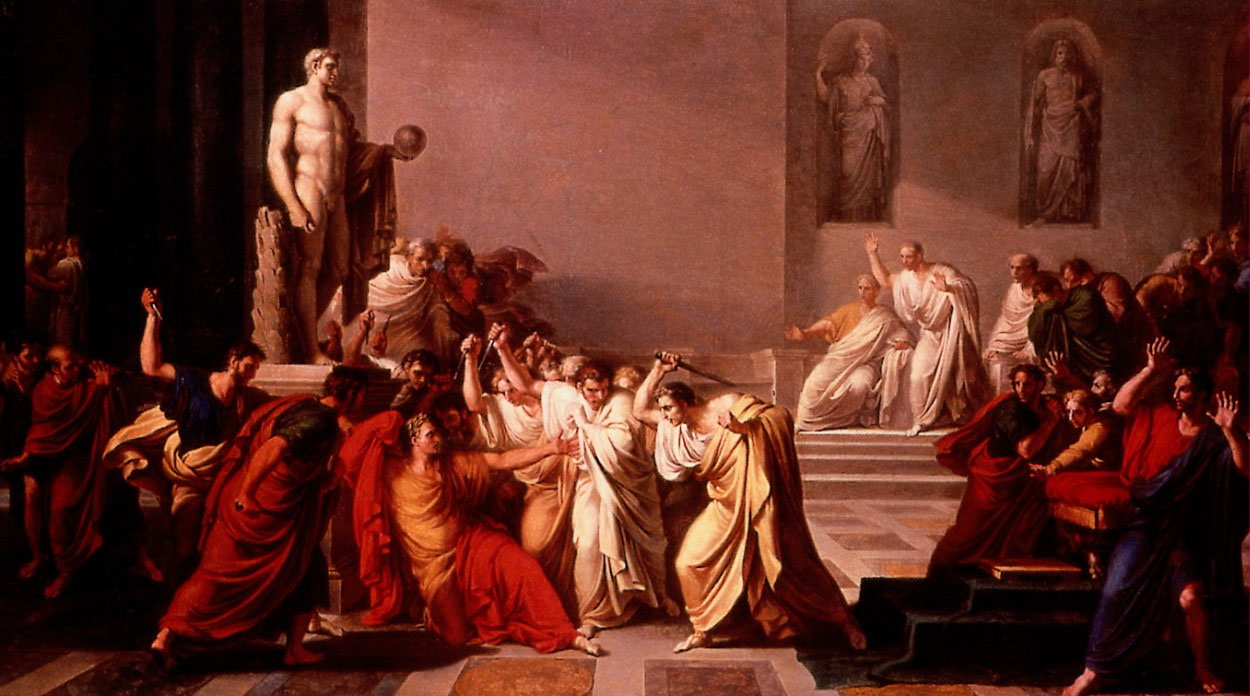It happened today - March 15, 2016
 While I’m piling up dead Caesars, it’s worth noting that March 15 is the dreaded Ides of March on which Julius Caesar was stabbed in 44 B.C. by, one sometimes gets the feeling, about half the population of Rome, in a long line waving knives. And rightly so, people long felt. Sic semper tyrannis, I would say, if that phrase had not been egregiously misappropriated by John Wilkes Booth.
While I’m piling up dead Caesars, it’s worth noting that March 15 is the dreaded Ides of March on which Julius Caesar was stabbed in 44 B.C. by, one sometimes gets the feeling, about half the population of Rome, in a long line waving knives. And rightly so, people long felt. Sic semper tyrannis, I would say, if that phrase had not been egregiously misappropriated by John Wilkes Booth.
What’s that? Why do I hate Caesar so? Well, it’s very simple and justified. I don’t know what he was like as a human being. But he went from being a successful general to an aspiring tyrant and when he got himself declared “dictator perpetuo” by the Senate, the Roman equivalent of the Communist “president for life” stunt, defenders of the old Republic took up arms and did him in.
It didn’t work, of course. Augustus in turn became dictator for life, without admitting it, followed by Tiberius and on down the line. And the fact that both Augustus and Tiberius did a good job, and the Republic was descending into chaos, led people to accept the subtle irreversible installation of an Emperor on the ruins of the Republic.
Fixing the Republic would have been no easy task. Had he lived, Julius Caesar too might have been a good Emperor. It’s hard to tell from the historical record what he was really like, why he wanted power or what he was likely to do with it. Many of the conspirators, despite posing as friends of liberty and the Republic, may have had unseemly aspirations of their own and they certainly came to bad ends. (One of them, Gaius Cassius Longinus, who actually seems to have been among the good guys, ended up committing suicide with the same dagger he’d used on Julius Caesar, which must have hurt even more than usually.)
I don’t know what Brutus might have been like had he too not been driven to suicide by defeat at the hands of Marc Antony, who really seems to have been a wretched character. Could they or anyone have saved the Republic? Was it worth saving given the incoherent dysfunction of its institutions and the restless ambition of its politicians?
It’s hard to say. But Caesar’s solution, seizing power by force of arms, wasn’t the right one. That’s why he was assassinated, and for centuries people recalled this courageous if failed attempt to preserve liberty as an example for the ages. That we no longer seem to do so is, I fear, a reflection of dwindling interest in the history of freedom.
We do not have Caesars, and I do not advocate assassination of anyone in a democracy. But we have accepted the growth of state power and the diminution of individual initiative in a way that would certainly have aroused the eloquent indignation of Cicero, who was not one of the conspirators but wished he had been, opposed Antony and dictatorship and was killed and his corpse publicly mutilated for it, after which Augustus claimed he was sorry for what his own allies whom he later defeated had done.
So yes, Julius Caesar got what he deserved on the Ides of March, even though it didn’t end up working. And it’s worth remembering why.